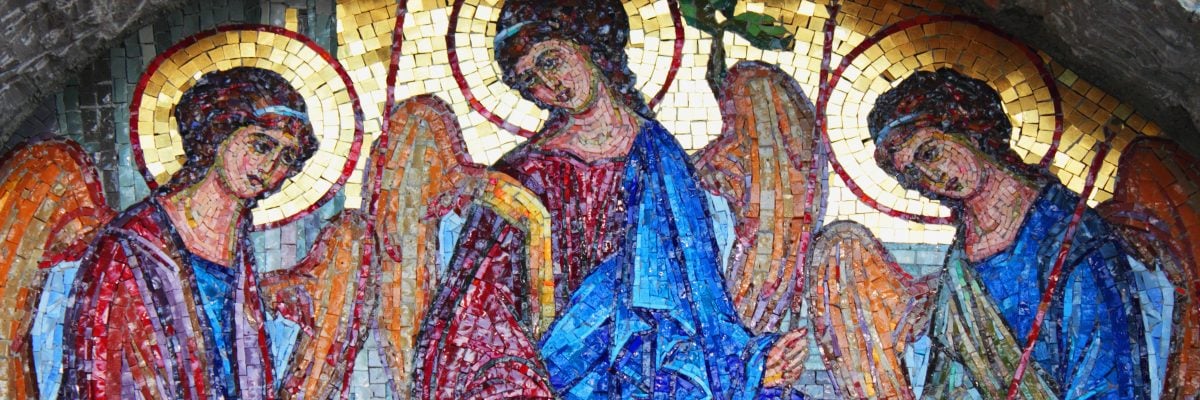
Homily for the Solemnity of the Most Holy Trinity, 2018
“If I were doing any better, I’d be twins!” One of my confreres at St. Michael’s Abbey has been known to answer this way to the simple question, “How are you?” Of course, only a happy person could say what my confrere says, although he does take some teasing for his slightly corny effusions!
Our God is a supremely happy God. The mystery of the Most Blessed Trinity, which we celebrate this Sunday, is the way in which he teaches us this truth. In fact, not only does he teach us about his infinitely rich and personal life of happiness “before all ages, “ but he teaches us this truth precisely so that we can arrive by faith and love at the same mysterious happiness ourselves. As St. Paul teaches us, “Eye has not seen nor has ear heard nor has it entered into the heart of anyone what God has prepared for those who love him” (1 Cor. 2:9).
We believe that God’s inner life is so blessed that, indeed, he is doing so well that he is not only one or two but even three in persons, in an infinite community of understanding and loving, all the while remaining one in nature and undivided in substance and being. God knows himself so well, so to speak, and loves the one he knows so well, that he and his knowledge and his love are three divine persons, one in substance and undivided: the Father, the Son, and the Holy Spirit.
This teaching, which we call the mystery of the Blessed Trinity, is the deepest heart of our religion and in fact the deepest heart of reality. And yet it is a truth that the human mind and heart cannot arrive at or possess on their own power. We call such a thing “supernatural,” not in the sense of parapsychology or television ghost documentaries, but in the sense that it is above the powers of human nature to prove or expound. It is not like 2+2=4, and although it sounds like 3=1, it is really neither of these. It is a mystery, we say; that is, something we know exists but cannot explain.
Now, why would God require us to believe, even become one of us to proclaim (as we see in Our Lord’s final words in today’s Gospel), something that is beyond our comprehension? Wouldn’t it be more reasonable just to reveal to us things about himself that we can then investigate ourselves to see if they are true, using just the powers of our human reason, as we do for so many important aspects of human life?
Well, he could have done just that, and indeed the scriptures and the teaching of the Church recognize the importance of this merely natural knowledge of God. If you don’t believe me, look at the seventeenth chapter of Acts, or the first chapter of Romans where Paul extolls the importance of natural knowledge of God. But even so, “God so loved the world that he gave his only begotten Son to the end that all who believe in him should not perish but have everlasting life” (John 3:16). That is, God’s love reveals his Son, in the inner life of the Holy Trinity, and they send their Holy Spirit upon us as the Son promised.
But why? Couldn’t God just wait and surprise us once we get to heaven with all the unknown and unknowable things he has to show and give us in his supreme goodness and happiness? Well, yes, and he will do that for us, as the quotation from Paul above indicates. Yet, even while we are here below in this “vale of tears” amidst the struggles and trials of this earthly life, God wants us to set our hopes on a life far beyond anything we can conceive. This provides us with a motivation, and better, a passion and longing for the life beyond this life with God.
St. Thomas Aquinas explains this well:
No one tends with desire and zeal towards something that is not already known to him. But men are ordained by the divine providence towards a higher good than human weakness can experience in the present life. That is why it was necessary for the human mind to be called to something higher than the human reason here and now can reach, so that it would thus learn to desire something and with zeal tend towards something that surpasses the whole state of the present life. This belongs especially to the Christian religion, which in a unique way promises spiritual and eternal goods. And so there are many things proposed to men in it that go beyond human sense.
It is also necessary that such truth be proposed to men for belief so that they may have a truer knowledge of God. For then only do we know God truly when we believe him to be above everything that it is possible for man to think about him; for, as we have shown, the divine substance surpasses the natural knowledge of which man is capable. Hence, by the fact that some things about God are proposed to man that surpass his reason, there is strengthened in man the view that God is something above what he can think (Summa Contra Gentiles, 5, 1-2).
Yes the revelation of the mysteries of the Faith, in the first place the Blessed Trinity which we celebrate today and then the Incarnation and Passion and glory of the Son, and his real and abiding presence in the holy sacraments, is simply so that we might not imagine that what God has in store for us is anything like what is measured by our minds or limited desires. The mysteries of the Faith are meant to tantalize us, and stir us up to desire God more. They are God’s wooing of our minds and hearts, a promise of secret delights to come in the heavenly bridal chamber that exceeds our understanding and experience.
How sad, then, that the devil and our own human dullness have managed to make the consideration of the mysteries of the Blessed Trinity and Incarnation into dry considerations. Not a few contemporary preachers will make light in their homilies of the details of these doctrines, of the painstaking and loving treatment they have received down through the centuries in the teaching and worship of the church and the witness of her saints and mystics.
The mystery of the Holy Trinity teaches us that our faith and love are not just about morality or social justice or being good or righteous, as important as these things are. Our faith and love are rather about the extreme and ravishing happiness that God intends to give us even after our paltry efforts here below. This is why it was nothing for the saints to bear with the difficulties of this life and to observe the commandments, because they understood that these things were nothing in comparison with what “God has in store for those who love him.” To that eternal happiness and trinity of persons may he lead you and me, world without end. Amen!



